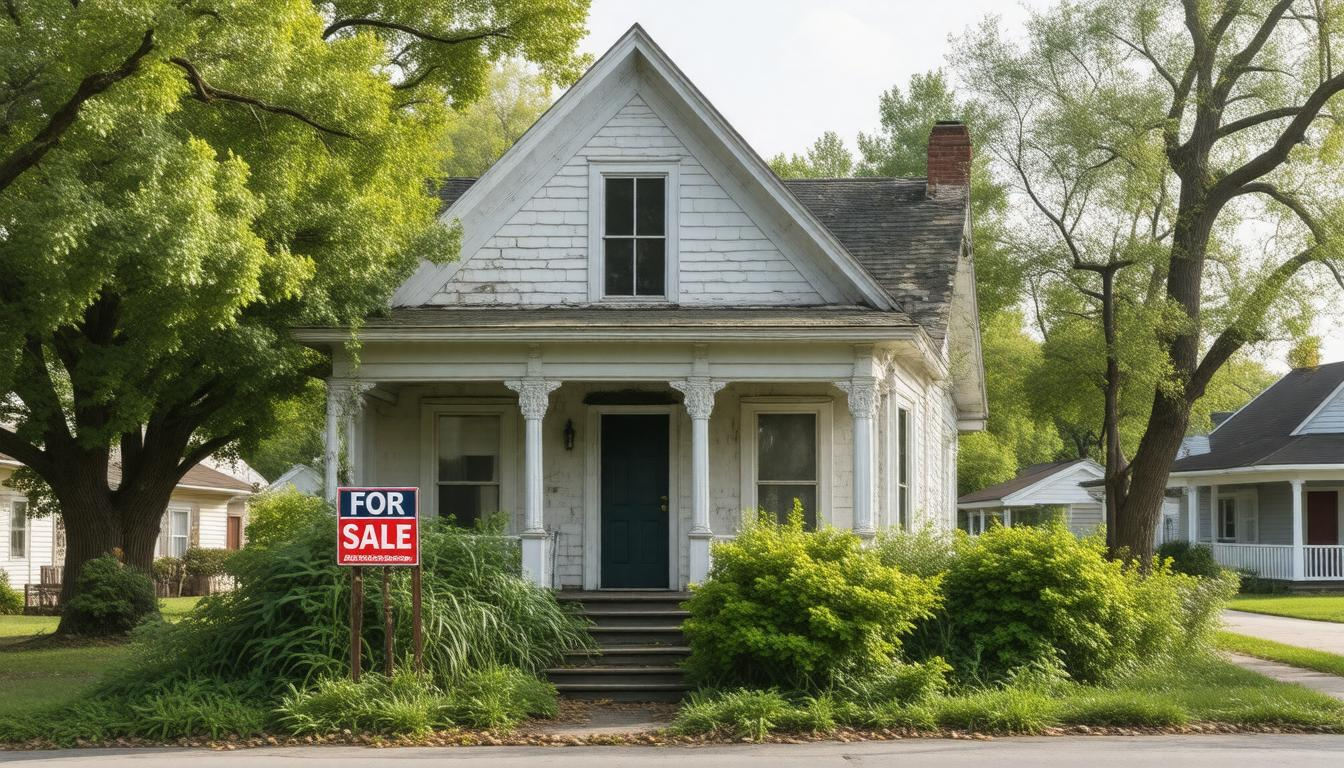Should I Sell My House As Is or Fix It Up?
Selling a house is a daunting task, especially when you are unsure whether to sell it as is or fix it up. Both have their pros and cons, and it's essential to weigh them carefully before making a decision. Selling your home as-is means that you are selling the property in its current condition without any repairs or renovations done beforehand. This can be beneficial for homeowners who don't have the time, money, or resources to make necessary repairs. However, selling an as-is house may not fetch the best price in the market and may even limit your potential buyer pool.
In contrast, fixing up your home before selling can increase its value and attract more buyers. But this approach requires significant investment, time commitment, and expertise.
In this blog post, we will delve into these options further and compare their implications so that you can make an informed decision that maximizes profit while minimizing emotional and financial stress.
Understanding the Concept of Selling 'As Is'
Selling a house as is refers to the practice of not making any repairs or renovations before putting it on the market. This approach can save homeowners both time and money by avoiding costly repairs. Furthermore, potential buyers may view an as is property as a fixer-upper opportunity. As a result, selling a house as is can attract cash buyers or real estate investors who are looking for projects they can renovate and resell for a profit. For homeowners who lack the resources to invest in repairs, selling as is can be an attractive option. It allows them to sell their home without having to incur the expenses associated with major repairs or renovations.
What Does It Mean to Sell a House As Is?
Selling a house as is means selling it in its current condition, without making any repairs or renovations. Sellers are not responsible for fixing any defects or issues with the house. Buyers purchase the house with all of its existing problems, as disclosed by the seller. Selling as is can help sellers avoid potential legal and financial liabilities.
Potential Advantages and Disadvantages of Selling As Is
Selling your house "as is" can have both advantages and disadvantages. On the one hand, selling as is allows you to save time and money by avoiding costly repairs. You don't have to worry about fixing major issues or dealing with home repairs. Additionally, selling as is may attract cash buyers or real estate investors who are looking for a fixer-upper opportunity. This could potentially lead to a higher sale price.
However, there are also disadvantages to selling as is. One drawback is that it can limit your buyer pool. Some buyers may be hesitant to purchase a house in need of repairs, which could potentially lead to a lower sale price. Additionally, selling as is may result in a longer time on the market, as it can take longer to find the right buyer.
Ultimately, whether to sell your house as is or make repairs depends on your personal circumstances and goals. It's important to weigh the pros and cons before making a decision. Assess your financial situation, consider the condition of your home, and determine what is realistic in terms of price. It's a good idea to seek advice from real estate professionals, such as a buyer's agent or listing agent, can help you make the right choice for your own home.
The Implications of Selling Your House As Is
Selling your house as is can have implications on the final sale price and the buyer pool. When a house is sold as is, buyers may perceive it as a higher risk, leading to lower offer prices. Additionally, the market value of a house in its current condition may be lower compared to a house that is in good condition. This can further impact the sale price. Selling as is also limits the buyer pool, as some buyers prefer move-in ready homes. It's important to carefully consider these implications before listing your house. Assessing the potential financial and logistical challenges can help you make the right decision for your specific situation.
How Much Might You Lose by Selling As Is?
Selling your house as is could result in potential financial losses. The amount you might lose depends on factors like the condition of your home, market demand, and comparable sales. Buyers may negotiate a lower price to account for necessary repairs or renovations. Consulting a real estate agent for a comparative market analysis can help estimate your potential sale price.
The Impact on Your Home's Marketability and Buyer Pool
Selling a house as is can have a significant impact on its marketability and the potential buyer pool. While it may limit the number of interested buyers, there are also certain advantages to consider. Selling a house as is can attract real estate investors or buyers who are specifically looking for a fixer-upper opportunity. These individuals may be willing to put in the necessary time, effort, and money to make the repairs and renovations themselves. However, it's important to note that marketability can be influenced by several factors, including the extent of repairs needed, local market conditions, and buyer preferences. Some buyers may prefer move-in ready homes and be hesitant to take on major repairs. Additionally, the final sale price of the property could be affected if the repairs needed are significant. Therefore, it is crucial to carefully evaluate these factors before deciding whether to sell your house as is or invest in making necessary repairs.
The Process of Selling Your House As Is
When selling your house as is, it's important to disclose any defects to maintain transparency and comply with legal requirements. This ensures that potential buyers are fully aware of the condition of the property. Additionally, conducting a home inspection before listing can help identify potential issues and set realistic expectations for the home buyer. By following these steps, you can navigate the process of selling your house as is with confidence and make the right choices for a successful sale.
Seeking Advice From Real Estate Professionals
When considering whether to sell your house as is or fix it up, seeking advice from real estate professionals can provide valuable insights. Consulting a real estate agent can offer guidance on various aspects of selling a house as is. They can help you determine the right pricing strategy, create an effective marketing plan, and navigate negotiations to maximize the potential sale value. Real estate agents have the expertise to target the right buyer pool for as is sales, such as real estate investors or house flippers. They understand the market dynamics and can help you make informed decisions. By leveraging their knowledge and experience, you can ensure that you are taking the right steps to sell your house in its current condition.
Importance of Disclosing Defects
When selling a house as is, it is crucial to prioritize disclosing any defects to maintain transparency and comply with legal requirements. Failing to disclose known defects can lead to potential legal issues or dissatisfaction from buyers. To ensure accurate and comprehensive disclosure, it is recommended to work with a real estate agent who can guide you through the process. An experienced agent can help you navigate the complexities of disclosing defects and provide valuable insights on what should be disclosed. By working with a professional, you can ensure that you are taking the right steps to disclose defects accurately and avoid any potential complications in the future.
Conducting a Home Inspection Before Listing
Conducting a home inspection before listing is a crucial step in the process of selling a house. It helps identify potential issues and allows sellers to set realistic expectations for buyers. By conducting a thorough inspection, sellers can gain a better understanding of the extent of repairs needed for an as-is sale. This information is valuable when determining the accurate pricing for the property. Moreover, having a home inspection report provides transparency to potential buyers, enabling them to make informed decisions. It also helps sellers avoid overpricing or undervaluing their house. A home inspection report ensures that the pricing is competitive and realistic, attracting more buyers and increasing the chances of a successful sale.
Fixing Up the House Before Selling: A Viable Alternative?
Consider investing in renovations to increase the value and appeal of your home for potential buyers. Updating outdated features, enhancing curb appeal, and improving energy efficiency can attract more interested buyers and potentially sell your house faster. Prioritize projects that offer maximum return on investment.
Repairs and Enhancements That Boost Property Value
Renovations in the kitchen and bathroom can have a significant impact on a home's value, attracting potential buyers who are looking for modern and updated spaces. Additionally, adding a fresh coat of paint throughout the house can give it a much-needed facelift, making it more appealing to buyers. Upgrading to energy-efficient appliances not only appeals to environmentally conscious buyers but can also save them money on utility bills in the long run. Enhancing curb appeal through landscaping improvements can make a home more marketable by creating a positive first impression. Lastly, installing new flooring can give a home a modern and updated look, increasing its overall value. By prioritizing these repairs and enhancements, homeowners can ensure that they are getting the most out of their investment.
How to Prioritize Projects for Maximum ROI
To maximize the return on investment when preparing your house for sale, it's important to prioritize projects that focus on addressing major issues and making a big impact. Start by tackling repairs that fix significant problems like a leaky roof or faulty plumbing. These repairs not only improve the overall condition of your home but also give potential buyers peace of mind. Additionally, consider projects that can make a big impact, such as a kitchen remodel or bathroom upgrade. These renovations tend to attract buyers and can significantly increase the value of your property. To determine which projects will yield the best return on investment, take into account the local market and buyer preferences. Consult with a real estate agent who can provide valuable insights into the most marketable features to prioritize. Lastly, consider the cost of repairs, potential sale price, and market value when allocating your budget. By carefully prioritizing projects, you can ensure that you make the right choices to achieve maximum ROI.
Choosing the Right Path: A Comparative Analysis
When deciding whether to sell your house as is or invest in repairs, there are several factors to consider. Selling a house as is can save you time, money, and effort on repairs and renovations. However, investing in repairs can potentially lead to a higher sale price and a quicker sale. To make the right choice, evaluate the condition of your home, market conditions, and your own financial situation. Additionally, assess the potential buyer pool for your home and determine if repairs are necessary to attract a larger audience. Compare the cost of repairs against the potential increase in sale price to determine if it is a worthwhile investment. By considering these factors, you can make an informed decision on whether to sell your house as is or fix it up.
Selling As Is vs. Investing in Repairs - A Cost-Benefit Analysis
When deciding whether to sell your house as is or invest in repairs, a cost-benefit analysis is crucial. Selling as is can save you money on repair costs, closing costs, and potential price negotiations. However, it's important to consider potential buyer perceptions, as this could impact the final sale price. On the other hand, investing in repairs can lead to a higher sale price, potentially offsetting the expenses. To make an informed decision, assess the repair costs, market value of your home, and potential buyer preferences. Consulting with a real estate agent can provide valuable insights on market conditions, buyer expectations, and potential sale price. Ultimately, weighing the cost-benefit of repairs and considering all factors will help you make the right choice for your specific situation.
Considerations Beyond Monetary Aspects
When deciding whether to sell your house as is or fix it up, it's important to consider factors that go beyond monetary aspects. Selling as is can save time and effort, allowing for a quicker sale and a fresh start. On the other hand, taking the time to repair and renovate can showcase your home's best features, attracting more potential buyers.
It's crucial to evaluate the potential stress and inconvenience of repairs, as well as the impact on your daily life during the selling process. Additionally, you should consider potential buyer sentiments. Some buyers may prefer a ready-to-move-in home, while others may see potential in a fixer-upper.
Reflecting on your personal priorities, long-term goals, and the potential emotional toll of repairs or selling as is can help you make the right decision. Ultimately, it's important to weigh these considerations alongside the financial aspects to choose the path that aligns with your needs and preferences.
The Emotional Aspect of Selling a Home
Selling a home can be an emotional journey, as it signifies a major life transition for many homeowners. The process can stir up a mix of emotions, especially when there is a deep attachment to the home. It's essential to seek support from loved ones during this time to navigate the emotional aspects. Take some time to reflect on the reasons for selling and the potential benefits of moving forward. Embrace the idea of a fresh start and new beginnings that selling your home can bring. Remember, it's normal to feel a range of emotions, and acknowledging and managing them will help you make the right choices throughout the selling process.
Navigating the Sentimental Value of Your Home During Sale
As you embark on the journey of selling your home, it's important to navigate the sentimental value attached to it. Take the time to bid farewell to your beloved abode by capturing memories, writing a heartfelt farewell letter, or even hosting a small gathering to celebrate the cherished moments you've shared within those walls. When choosing a real estate agent, ensure they understand the emotional significance of your home and can provide guidance throughout the sale process. Consider that potential buyers may also attach sentimental value to a home's history, charm, or unique features. It's crucial to strike a balance between the sentimental value and realistic market expectations to make informed decisions during negotiations. As you move forward, focus on the potential for a new chapter, new memories, and a fresh start.
Dealing with Potential Buyer Sentiments
Being receptive to potential buyer feedback is crucial, as it can provide valuable insights into how to effectively market your home. Emphasize the features of your home that can evoke positive buyer sentiments, such as abundant natural light, open floor plans, or a well-maintained garden. By staging your home, you can create a warm and inviting atmosphere that allows potential buyers to envision themselves living there. It is essential to communicate the value of your home, its unique features, and its potential for personalization to potential buyers. Promptly addressing potential buyer questions and concerns builds trust and helps address any red flags that may arise. By implementing these strategies, you can navigate potential buyer sentiments successfully and increase the likelihood of a successful sale.
Additional Insights for a Profitable Real Estate Transaction
To ensure a profitable real estate transaction, seeking advice from a real estate agent is essential. They can help determine a competitive asking price for your home and guide you on marketing strategies. Take advantage of listing services, real estate agents, and online platforms to reach a wider audience. It's crucial to consider the potential costs involved, such as necessary repairs, closing costs, agent's commission fees, and other expenses, when calculating a realistic final sale price. Consulting a real estate attorney can also be beneficial in navigating legal complexities, contracts, and potential buyer negotiations. Additionally, preparing for a home inspection by addressing necessary repairs increases buyer confidence and reduces the chance of deal-breakers.
How Can an Informed Decision Ensure a Smooth Real Estate Transaction?
Making an informed decision is crucial for a smooth real estate transaction. It involves knowing the market value and researching comparable homes for a realistic asking price. Understanding potential repairs, consulting a real estate agent, and being aware of closing costs are also essential factors.
Conclusion
In conclusion, deciding whether to sell your house as-is or fix it up requires careful consideration of various factors. Selling as-is may offer advantages such as saving time and avoiding the hassle of renovations. However, it may also result in a lower sale price and fewer potential buyers. On the other hand, fixing up your house before selling can increase its marketability and potentially fetch a higher price. Consider the cost of repairs and the potential return on investment. Additionally, take into account the emotional aspect of selling a home and the sentimental value attached to it. Ultimately, it's important to make an informed decision that aligns with your goals and priorities for a profitable real estate transaction.











